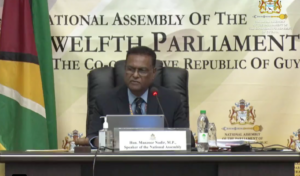Options exist to ‘crackdown’ on ‘abusers’ of local content law – President Ali

By Kurt Campbell
Kurt@newsroom.gy
Several senior members of the Irfaan Ali-led government have admitted that there are foreign companies in Guyana attempting, through clever and deceitful means, to benefit from a schedule of services set aside in the Local Content Act for Guyanese.
As recently as Tuesday night, Vice President Dr. Bharrat Jagdeo said the government has already found it difficult to enforce the law because some companies are attempting to bypass the provisions of the legislation.
And President Dr Irfaan Ali on Wednesday weighed in on the developments which have already seen one company being denied a local content certificate.
According to Dr. Ali, the government has options at its disposal to crackdown on persons who are seeking to abuse the law and exploit apparent loopholes.
“There are different institutions that can go after those who try to abuse the system and use loopholes to satisfy criteria,” Dr. Ali said at the sidelines of an event.

In addition to the 51 per cent ownership, the law also stipulates that Guyanese nationals must hold at least 75 per cent of executive and senior management positions and at least 90 per cent of non-managerial and other positions.
But the government fears the legislation is now promoting ‘rent-seeking’ behaviour where Guyanese are placed in positions to satisfy these criteria while profit sharing is manipulated and some locals who are placed in management positions are receiving junior salaries.
According to Dr. Ali, the government will be looking at the shareholding arrangements in these companies, proof of where these Guyanese got the money to buy shares, and documents on beneficial interest will have to be reviewed.
Dr. Ali acknowledged that local content was a new concept to Guyana but assured that the government is continuously analysing the law to deal with loopholes and the areas of manipulation.
Meanwhile, Dr. Jagdeo had explained the government’s difficulty.
“We did not want the legislation to promote rent-seeking behaviour on the part of Guyanese but on the other hand, we didn’t want people to try to dupe us.
“It’s been brought to my attention that a company, for example, with three foreign directors…to get past the legislation… they simply take junior staff and change their designations so the management team can become larger for them to fulfill the requirement.”

“To bypass, some companies have decided to give Guyanese companies 51 per cent but what they doing is charging a huge service fee and management contract fee. They take the revenue off the top so the profit margin is smaller,” he added.
Dr. Jagdeo said it’s a delicate matter because should the government put more measures in place, then Guyanese investors abroad can be targeted and the country could be exposed to new trade barriers.
“Frankly speaking, these oil and gas companies have a pattern of behaviour that they find it convenient to work with big and foreign companies, they don’t make the additional effort to try to grow local companies and the law has to force them to do that,” Dr Jagdeo reasoned.













